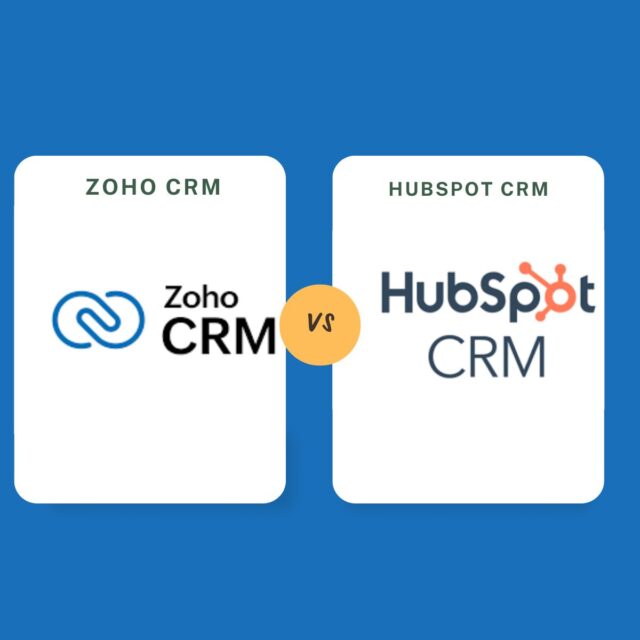The strength of sales and marketing teams today is the Customer Relationship Management (CRM) software. Anyone who has come across the vast amount of choices available on the market will understand that HubSpot CRM and Zoho CRM are two hot products that regularly compete against each other. Both of the platforms have significant strengths in terms of their customer data management, automation workflow management and communications facilitation tools and capabilities, but which one can add more value to your company?
Reading this blog, we compare top features, rates, automation, AI functions, customization, and all other aspects that may help you to make the decision of which CRM is more suitable for your business in 2025.
Zoho vs. HubSpot : Which CRM Best Fits Your Business Needs?

Comparison between Prices: It Comes Down to the Budget
With regard to affordability, Zoho CRM is excellent. It also has a free package which accommodates three users and provides basic CRM applications. The price begins at $14/user/month for the paid plans, with key features such as sales forecasting and scoring rules.
HubSpot CRM has a more powerful free package, but it soon becomes costly when its requirements increase. The price of the Starter package is $20/month, and the price of the Professional package is as high as five users in the case with $450/month indicating the Professional package, and it is as high as 1200/month in the case of the Enterprise package.
The winner is Zoho CRM.
More features at lower-tier plans for a better value for money.
Ease of use and User interface
HubSpot CRM has been many times lauded because of its user-friendly interface and usability. It is smooth to set it up even when the user is new to CRM and its user-friendly dashboards, as well as drag-and-drop customizations.
Albeit flexible and functional, Zoho CRM comes with a steeper inclination and in particular, such a system may not be a good fit with teams that have never used tailor-made systems. Nevertheless, it pays off to learn with its level of features.
The HubSpot CRM is the winner.
It is a great option to consider in teams that have user-friendliness and a faster learning curve as their major requirements.
Automated Sales and Processing of Workflow
Productivity is a key factor that requires automation to enhance the growth and expansion of your business.
HubSpot also offers complex choices in the form of Sequences and Workflows. Nevertheless, they are only provided in the plans with higher tariffs, which may not be affordable to small businesses that are conscious of cost.
Automation of the workflow in Zoho CRM is available in all paid plans; plus, it has productivity tools such as macros, SalesSignals and Zia suggestions.
The winner reflects Zoho CRM.
Provides greater flexibility in terms of automation at lower prices.
Lead Tracking Conversion And Leads Management
Zoho CRM has powerful tools such as lead scoring, assignment rules, multi-channel capturing and Artificial Intelligence-based Zia predictions in order to facilitate the turning of leads.
HubSpot CRM is an efficient system in terms of real-time lead tracking, email sequence and automated lead nurturing that provides a complete picture of the customer lifecycle.
The HubSpot CRM is a winner.
More effective in fostering and monitoring a complicated customer path.
AI Capabilities: Zia vs HubSpot AI
One of the outstanding features is the Zia AI of Zoho, which busts sales forecasting, detects anomalies, responds to speech requests, and preventive workflow recommendations. Zia has also filled contact profiles and updated data using the content of the email automatically.
HubSpot does not have functionality as in-depth and sophisticated as Zia because it only has some rudimentary AI features, like predictive lead scoring and automated call transcriptions.
The winner was Zoho CRM.
Zia provides more features in AI in sales, marketing and support.
Tailoring and Adaptation
Things are different when it is a matter of tailoring the CRM to your processes instead of vice versa, and Zoho beats the competition convincingly. You are also able to build tailor-made modules, layouts, and workflows and even execute the changes in a test environment (sandbox).
Though it can be customizable at higher levels, HubSpot CRM will not be fully customizable in free and Starter plans. Only at the Enterprise level there are custom modules and reports.
The winner will be Zoho CRM.
It is perfect for companies with heavy demands for personalized CRM implementations.
Analytics and Reporting
HubSpot CRM is also known to provide progressive dashboards with a visual aspect, particularly when its Marketing Hub is incorporated. It will allow you to monitor the attribution of revenue, the flow of the funnel, and the interaction of customers, but once more, it has features of a premium level.
In the lower-tier plans, Zoho CRM offers custom dashboards, elaborate reports and insights into the extent of data. It also has integration with Zoho Analytics to give more capabilities to its BI.
Winner: Draw
HubSpot has a more excellent reporting UI, whereas Zoho is deep and cost-effective.
Final Thoughts
Choosing between Zoho CRM and HubSpot CRM, Zoho clearly stands out as the better option for most businesses. With its affordable pricing, flexible automation, advanced AI-powered assistant (Zia), and extensive customization options, Zoho CRM provides far greater value—especially for small and mid-sized businesses that want scalability without overspending.
While HubSpot shines with its user-friendly interface and strong marketing integrations, its higher costs and limited customization at lower tiers can become barriers for growing teams. On the other hand, Zoho CRM combines affordability, depth of features, and adaptability, making it the smarter, more cost-effective choice for companies that want a powerful CRM tailored to their unique processes.
Simply put—Zoho CRM is better than HubSpot if you want maximum features, flexibility, and value for your money.









